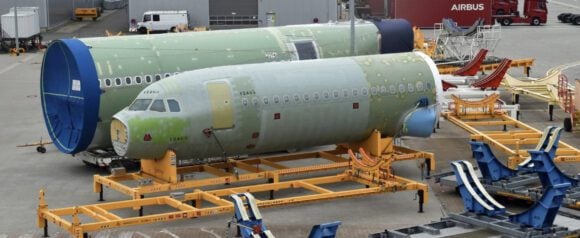
image: centsai.com
The Trump administration in the United States has altered the economic order globally, and the new economic realities will impact airlines, aircraft manufacturers, and the supply chain supporting the industry. While the depth of those impacts remains unknown, the “on-off-on-but-delayed” tariffs has created uncertainty and made it difficult for businesses to clearly plan their futures. Lets examine what we do know and where we are in the cycle.
Demand for Travel is Changing
Between a drop in the stock market causing concerns over discretionary spending, fear of incarceration at US airports for the slightest visa errors for foreigners, and anti-US sentiment resulting from the administration advocating annexing Canada, Greenland, and the Panama Canal, international tourism is falling dramatically from forecast levels. The new economic realities are causing airlines to re-think their strategies, and adjust their schedules for the shoulder and peak travel seasons in 2025.
Flight bookings from Canada to the U.S. have plummeted by up to 76% in early 2025 compared to the same period in 2024. This sharp decrease is attributed to several factors, including the imposition of new tariffs by the U.S., a weak Canadian dollar, and increasing anti-American sentiment among Canadians.
European travel has dropped significantly, reflecting an aversion to tourism. Europeans are now subject to travel warnings about the U.S., and U.S. travelers are concerned that they may not be well received at their destinations. Uncertainty about travel is impacting the market.
China travel has still not fully rebounded from the pandemic, and tariffs and warnings about visiting the U.S. are impacting demand this year. The outlook that projected a return to pre-pandemic levels by year-end have been revised downward, as the new economic realities set in. Uncertainty about where tariffs will end-up, particularly given new exemptions for key electronic components, adds to the current confusion of where tariffs and trade wars will lead.
The Impact on the Industry
While some airlines are planning for a recessionary economy, others see a potential for an uptick in domestic travel. What is clear is that expansion plans and new routes are being re-considered, particularly for international travel. Already, Canadian airlines have cut capacity to the United States, and the reverse is now happening as well. With European tourism dropping, adjustments to summer schedules may be needed as the current high load factors are beginning to drop in future bookings. If this turns out to be a long-term rather than short-term trend, we could expect changes in airline orders to match the market changes. But the uncertainty makes it difficult to take key decisions based on what could become a short-term, rather than long-term, impact.
The impacts are both direct and indirect. The consumer impact on air travel impacts airlines directly, but indirectly impacts aircraft OEMs, engine OEMs, the supply chain, and MRO and support facilities in addition to passengers. Understanding how the new economic realities impact their business, particularly when those realities are fluid, is a nearly impossible task.
Direct Impacts of Tariffs
Delta Air Lines became the first airline to postpone delivery of new aircraft from Airbus that are subject to tariffs, as the carrier is refusing to pay for tariffs. Of course, with Airbus having a final assembly line in Alabama for narrow-body aircraft, and substantial U.S. content in those aircraft, they will be similar to Boeing in terms of domestic content, leveraging the industry’s international supply chain. But their wide-bodies coming from Europe are tariff targets, currently at a 10% level.
We would expect carriers facing falling traffic to postpone aircraft and those serving markets that they hope will grow taking their delivery position as the industry reacts to the impact of the new import taxes. Industry participants are split as to whether they believe that tariffs will become permanent, or if segment by segment and country by country exemptions are made. The postponement of a Boeing order by a Chinese carrier, if replicated for all Chinese orders, would have a significant impact on Boeing, which continues to recover from its multiple 737 MAX debacles.
Uncertain Outcomes Ahead
With a postponement for 90 days, a lot can change over the next dozen weeks. If past is prologue, we may or may not know what is going to happen until the 88th or 89th day. The new economic realities have an element of fluidity. Of course, that type of uncertainty makes planning difficult, as decisions on aircraft and routes cannot be easily reversed should circumstances change. As a result, we expect more airlines to follow Delta’s lead and be conservative in both expansion and fleet planning decisions. While that is well and good, should tariffs lead to country by country renegotiations, that may result in an unexpected change in policies.
With high demand for aircraft and 7 year plus waits for airlines wanting to order new aircraft, a deferral or cancellation presents an opportunity for an airline that has been waiting for aircraft to move up in the delivery skyline to obtain aircraft faster. Airlines replacing older, less fuel efficient aircraft or have aircraft that could be retired, rather than be put through an expensive overhaul, provide significant opportunities to move up the delivery list.
As a result, we expect minimal disruption for OEMs for 2025, as most deliveries are already set. For U.S. airlines subject to tariffs, aircraft will likely be deferred, as we expect OEMs and suppliers to utilize force majeure clauses to enable a pass through of tariffs to customers. Howmet, a key member of the supply chain for engine parts, has utilized its force majeure clause to ensure it is not the one who pays tariffs without reimbursement.
At the same time, customers of Boeing who are subject to import tariffs instituted in retaliation will likely defer their orders in hopes that sanity returns to international trade regulation. The bottom line is that Boeing has more to lose than Airbus, who have a global production strategy in five countries versus Boeing’s single country strategy. Airbus can deliver aircraft to customers outside the United States without significant impacts, except for U.S. sourced components.
The Bottom Line
The element currently driving decision-making with the new economic realities is uncertainty. We have uncertainty for tourism and how travelers crossing the ocean will be treated on arrival. We have questions on how many will postpone their travel, given the stock market decline and lower discretionary funds. We don’t yet know how the drop in travel will impact airline routes and profitability, and whether mitigation strategies such as focusing on premium cabins or focusing on domestic travel will work.
Airlines don’t have enough information yet to make decisions on aircraft needs, which may depend on how tariffs on full airplanes and aircraft spares evolve. OEMs don’t yet have enough information on tariffs on raw materials and components made on a country by country basis. We still don’t know whether force majeure clauses could result in the deferral, or outright cancellation, of orders than aren’t delivered at contractual pricing. We still don’t know whether key small suppliers could suddenly go out of business, causing production shortfalls for aircraft.
What we do know is that the industry faces a confusing and complicated set of new economic realities on all fronts, with little actionable information on which to plan. The industry needs stability in economic policies to continue to smoothly function. If past is prologue, it is questionable whether that information will be available before the end of the second quarter. Uncertainty reigns.
Views: 246
About The Author
Take AirInsight for a Test Flight
7 days full access — premium analysis and the complete data model library — for $1. No commitment.
Start My Test Flight →



